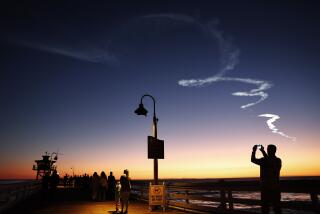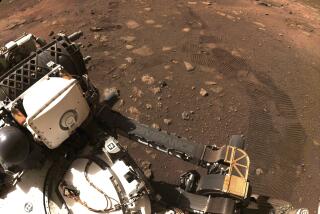Earthlings, get ready for a close encounter with an asteroid

The asteroid, currently known as 2018 CB, will come closer to Earth than the moon.
Heads up, Earthlings! An asteroid will zip past our planet on Friday afternoon at 2:30 Pacific time, coming five times closer to us than the moon.
This is definitely a cause for celebration, not concern. After all, it’s not every day that a space rock flies this close to the Earth, and scientists at the Jet Propulsion Laboratory in La Cañada Flintridge say there is no chance it will impact the planet.
The rocky visitor was first spotted Sunday by the Catalina Sky Survey — a series of three telescopes located in the Santa Catalina Mountains north of Tucson.
Astronomers say it is between 50 and 130 feet wide, which means it may well be bigger than the asteroid that entered the atmosphere over Chelyabinsk, Russia, and slammed into the ground nearby in 2013.
It is expected to come within 39,000 miles of Earth at its closest approach. For comparison’s sake, the moon is, on average, 238,900 miles away.
The asteroid is currently known as 2018 CB, and its closest approach comes on the heels of another asteroid flyby, which occurred Tuesday at 12:10 p.m. Pacific.
That one, named asteroid 2018 CC, didn’t come quite so near, however. Scientists calculated its closest approach was a distance of 114,000 miles from Earth.
Paul Chodas, manager of the Center for Near-Earth Object Studies at NASA, said asteroids the size of 2018 CB do not often approach this close to our planet. “Maybe only once or twice a year,” he said in a statement.
In the daytime sky, you won’t be able to see the relatively small asteroid as it zips past. But at 2:30 p.m., you might take a quick break from whatever it is you are doing to acknowledge the lonely space traveler’s quick trip through our Earth-moon system.
Do you love science? I do! Follow me @DeborahNetburn and “like” Los Angeles Times Science & Health on Facebook.
MORE IN SCIENCE
That dinosaur-killing asteroid also triggered massive magma releases beneath the ocean, study finds
Snooping around in hospital pipes, scientists find DNA that fuels the spread of superbugs







